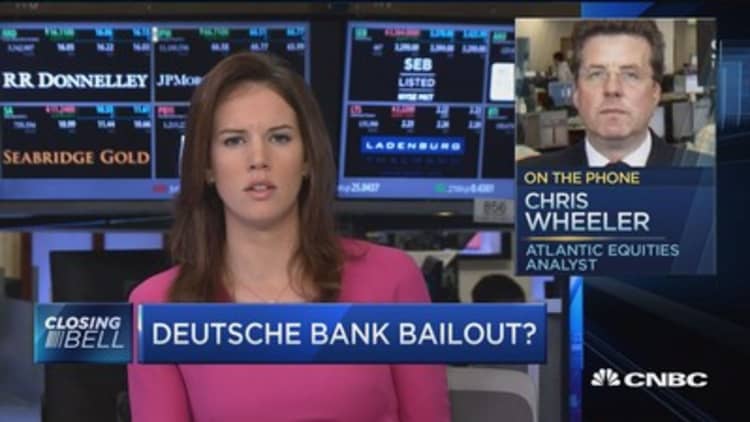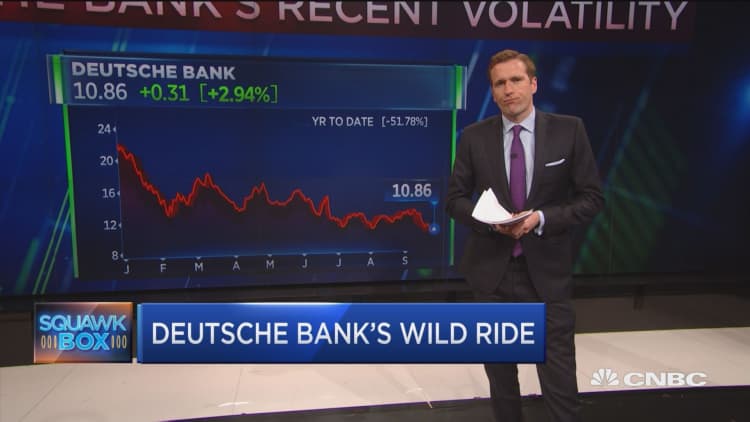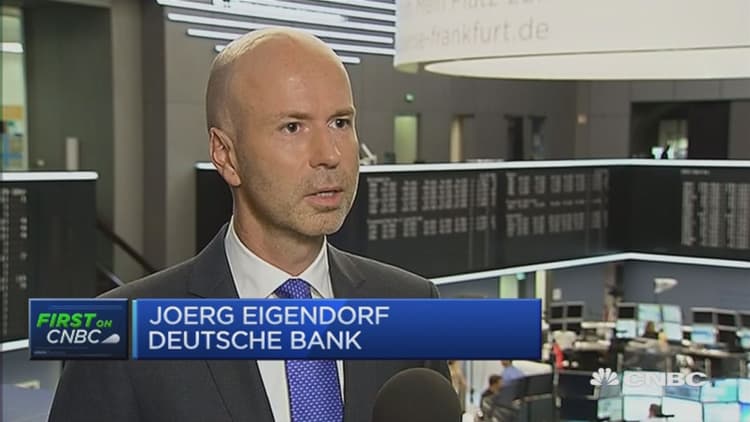
Only a substantial intervention by the German government can stop the collapse of the country's largest lender, Deutsche Bank, according to Stefan Müller, the CEO of Frankfurt-based boutique research company DGWA.
"Deutsche Bank doesn't realize that something serious needs to happen," he told CNBC via telephone on Thursday morning. "(CEO John) Cryan clearly showed that he has no idea how to survive."
The bank has repeatedly defended itself over recent weeks, however, telling CNBC that there is "no reason to worry" and that the bank had a "comfortable cushion."
The embattled German lender saw a respite on Wednesday from hefty selling seen in previous sessions amid contradictory reports on whether the German government had a rescue plan for the bank. Cryan also tried to reassure investors about the bank's capital strength by telling the tabloid newspaper Bild that "state aid is not an issue."

The outspoken Müller - who does not hold a position on the bank's stock - said he believed Chancellor Angela Merkel had personally forced Cryan to do the interview with the German newspaper. He also told CNBC that there was no way the German government would admit to it, but, "of course there is a rescue plan, that's their job."
Müller added that any type of financial aid or bailout would be difficult for Merkel ahead of elections next year as well as creating "moral hazard" for other lenders - where there is a lack of incentive to guard against potential risks due to the government backstop.
Deutsche Bank's stock has slid over 50 percent so far this year and the cost of insuring exposure to its debt has risen sharply. It has come under pressure from aggressive short-selling, notably from some large hedge funds. This includes Soros Fund Management, the family office run by George Soros, which has built up a short position, according to a regulatory filing earlier this year.
The latest concerns about the bank come after the U.S. Justice Department suggested it pay $14 billion to settle a number of investigations related to mortgage securities. The probes refer to the way it sold these securities before the financial crash of 2008. It came after initial worries about Deutsche Bank surfaced earlier in the year, with investors detailing concerns over its exposure to the energy sector and a possible cash crunch.

Many analysts also do not expect government support will come at this point, or that it will even be necessary, however. Many also don't see a systemic risk to other banks or that this could trigger a financial crash like that seen in 2008.
"It's not a Lehmans moment in the offing. Banks are generally better capitalized and able to cope with adverse shocks. And Deutsche's derivatives exposure can be overstated," Neil Wilson, a markets analyst at London-based spreadbetter ETX Capital said in a note Wednesday. "Deutsche's problem is not capitalization – it's just that its costs have soared (mainly through litigation and fines) and it's not that profitable anymore."
Meanwhile, Markus Stadlmann, chief investment officer of Lloyds Private Banking, told CNBC Thursday that investors shouldn't throw the "baby out with bath water" with regards to the bank.
"Deutsche still has a very strong franchise, I think John Cryan is a very strong CEO who can turn the ship around," he said. "It has a lot of clout in European markets but also in the Middle East, some Asian markets ... it's more of a balance sheet, liquidity, capital issue."
Deutsche Bank's market capitalization currently stands at around $16.8 billion and there's hopes that the $14 billion settlement from the DOJ would be reduced. Joerg Eigendorf, head of communications at Deutsche Bank, told CNBC earlier this month that the bank was "very confident" it would be able to negotiate this number "significantly down."
Müller said he believes that the government will not pay the settlement but will instead guarantee the survival of a heavily-restructured Deutsche Bank, which would thus would avoid a collapse.
"The next hard facts will be (third-quarter earnings figures on October 27) and a rating downgrade – we also expect management 'news' soon," Müller said in an email to CNBC on Wednesday.


